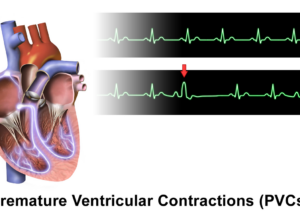
Are you losing sleep over the worry that insomnia can increase the frequency of premature ventricular contractions (PVCs)?
There can be a connection between premature ventricular contractions and insomnia because lack of sleep can cause a surge of adrenaline, says cardiologist David N. Smith, MD, a board certified cardiologist with Dynamic Health in Charlotte, NC.
This causes stress and agitation to the heart muscle.
“The heart then skips a beat felt as a palpitation but reflective of muscle twitching or premature contractions,” says Dr. Smith.
Insomnia often results from excessive worrying.
You lie down in bed for the night, and your mind becomes swamped with all of the stressors in your life — perhaps things that happened to you earlier in the day, or maybe all the tasks you must complete or start on the next day.
So you can’t fall asleep because you keep re-enacting the day’s earlier stressful events, including how you should have handled them, and/or, you’re envisioning the next day’s stressors and what the outcome might be.
This anxiety shakes up the body and incites a “fight or flee” hormonal environment.
Problem is, you can’t fight or flee while lying in bed. Instead, you’re trying to get to sleep.
The inability to fall asleep compounds the stress. Don’t be surprised, then, if you start feeling palpitations or PVCs.
Another consideration is this: Insomnia is frequently caused by stress, and so are PVCs.
They may occur together but not necessarily have a cause-and-effect relationship.
To help relieve insomnia and PVCs, don’t go to bed without first creating a “to-do” list for the next day, complete with any phone numbers and names of contacts whom you must do business with or interact with.
If you intend on visiting websites, have them already bookmarked.
Have your breakfast already prepared as much as possible (e.g., fruit washed and set out for the smoothie).
Have next-day’s clothes laid out and shopping list made, etc. Don’t eat close to bedtime; have your last fluid intake three hours before, if possible, so that you’re not awakened by nature’s calling.
If you have a clock radio, set it to a favorite station to turn off in 30 minutes.
Then get into bed and clear your mind. This will help reduce insomnia and premature ventricular contractions.

Dr. Smith is a published author, national lecturer and Yale-trained physician-scientist certified by the American Board of Internal Medicine in Cardiovascular Disease.
 Lorra Garrick has been covering medical, fitness and cybersecurity topics for many years, having written thousands of articles for print magazines and websites, including as a ghostwriter. She’s also a former ACE-certified personal trainer.
Lorra Garrick has been covering medical, fitness and cybersecurity topics for many years, having written thousands of articles for print magazines and websites, including as a ghostwriter. She’s also a former ACE-certified personal trainer.
.









































